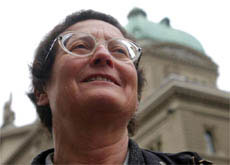Swiss women fired up on Women’s Day

Hundreds of women dressed in red took to Switzerland’s streets on Monday, blowing whistles and brandishing the slogan “We are angry”.
This year’s International Women’s Day was marked with more fervour than usual, after last year’s cabinet elections left only one woman in government.
Justice Minister Ruth Metzler was ousted from the cabinet in December, to be replaced by the rightwing politician, Christoph Blocher. The foreign minister, Micheline Calmy-Rey, is now the only woman in the seven-strong cabinet.
Andrée-Marie Dussault, editor-in-chief of the Geneva-based “L’émilie”, the world’s oldest women’s magazine, says Women’s Day is an important occasion around the globe.
“This day is very important as it provides an update on the progress made by women all over the world,” Dussault told swissinfo.
The Iranian Nobel Peace Prize winner, Shirin Ebadi, expressed her frustation by appearing in black at a conference at the International Labour Organization (ILO) in Geneva, as a sign of “mourning” for women’s rights.
“Unfortunately the situation for women in Islamic countries is not what it should be. Women there suffer,” she said. “Women’s rights are human rights.”
Permanent vigil
The Swiss capital, Bern, awoke to the sounds of ringing alarm clocks and rattles as women tried to attract attention on their special day, which was first celebrated in Copenhagen in 1909.
It was also the start of a vigil outside the parliament building to call for greater female representation in government.
On Monday, authorities gave the green light to the vigil, which aims to have at least one woman permanently on site until December 10 – the one-year anniversary of the cabinet elections.
Switzerland ranks 25th in the world when it comes to female representation in parliament, according to the Geneva-based Inter-Parliamentary Union (IPU), with women making up nearly 25 per cent of parliamentarians.
Rwanda has the most women in parliament with 48.9 per cent, followed by Sweden (45.3 per cent) and Denmark (38 per cent), says the IPU.
Obstacles
Dussault believes progress has been made in the past three decades, but points to numerous obstacles.
“Women’s rights have improved immensely over the past 30 years, but there is still a lot to do, especially in Switzerland.
“We still don’t have statutory [paid] maternity [leave] and we don’t have enough crèches, and the ones we do have are too expensive,” she lamented.
“And Swiss women still earn less money than their male colleagues.”
According to the Federal Statistics Office, Swiss women earned 20.9 per cent less than men doing the same job in 2002. More than half of all employed women work part-time.
Equal rights have been enshrined in the Swiss constitution since 1981. The Swiss authorities launched the Federal Office for the Equal Rights for Men and Women in 1988.
swissinfo with agencies
Jobs: More than half of all working women work part-time. In 2002, women earned 21% less than men.
Housework: Swiss women spend twice as much time doing housework as do men.
Politics: Women account for 26% of parliamentarians in the House of Representatives, and 24% in the Senate.
The first national Women’s Day was celebrated in the United States on February 28, 1909.
In 1910, Socialist International established an International Women’s Day at a meeting in Copenhagen, to honour the movement for women’s rights.
International Women’s Day was marked for the first time in Switzerland, Austria, Denmark and Germany in 1911, with more than one million women and men attending rallies.
In 1975, the United Nations designated March 8 as International Women’s Day.
Women won the right to vote in Switzerland in 1971.
Equal rights were enshrined in the Swiss constitution in 1981.

In compliance with the JTI standards
More: SWI swissinfo.ch certified by the Journalism Trust Initiative










You can find an overview of ongoing debates with our journalists here . Please join us!
If you want to start a conversation about a topic raised in this article or want to report factual errors, email us at english@swissinfo.ch.